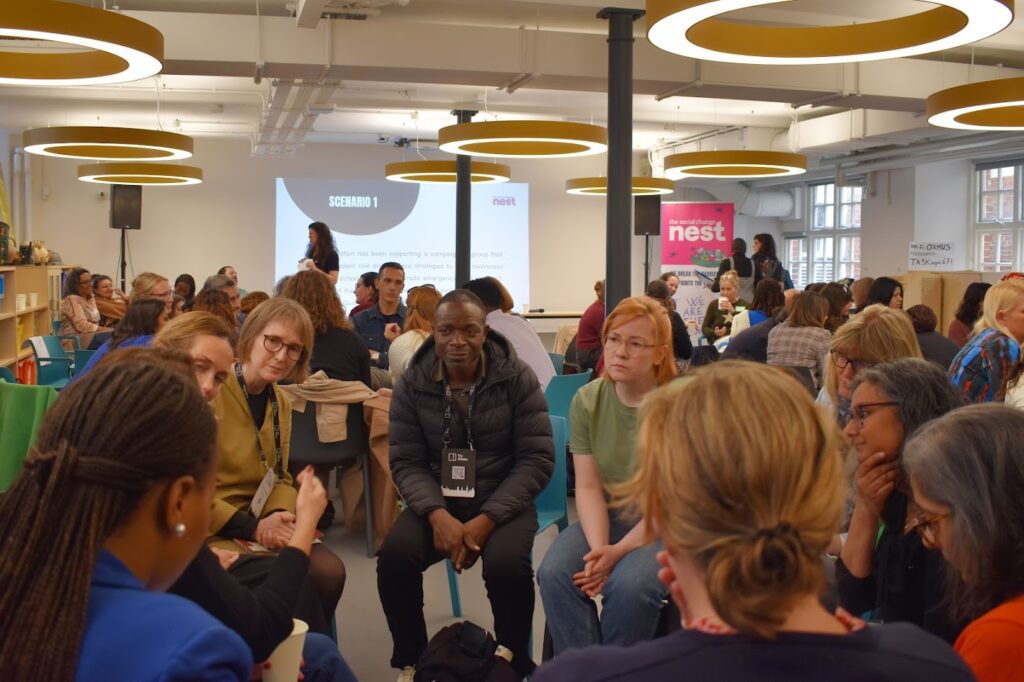Adopting fiscal hosting as a route to more equitable giving
 We chatted with Lankelly Chase’s Place Lead, Joe Doran, about the charitable foundation’s adoption of fiscal hosting and how it has changed their infrastructure for good.
We chatted with Lankelly Chase’s Place Lead, Joe Doran, about the charitable foundation’s adoption of fiscal hosting and how it has changed their infrastructure for good.
Tell us about Lankelly Chase’s mission?
We’re a 60 year old independent charitable foundation and network. In July 2023 we announced our bold plans to wholly redistribute our assets and close in the next five years. By relinquishing control of our assets our aim is to help money flow freely to those on the frontline of social justice work.
Over the last 60 years we have collaborated with partners to change systems of injustice and oppression that result in the mental distress, violence and destitution of people subject to marginalisation in the UK. The change we’ve tried to make in the world is creating an equitable resourcing infrastructure, of which fiscal hosting plays an important part.
What barriers are currently being faced by the groups in need of support?
Lots of organisations are recognising the need to find alternatives to traditional organising methods, and then funding those alternatives. Whether that’s more people turning away from becoming a charity or moving away from being a CIC, they just want to be a group of people who are able to eb and flow as they are serving change. They want to be able to change but still receive money. I’m seeing more and more groups of people that need to sit outside of legal governance and structures, and The Social Change Nest are doing a brilliant job of pushing that to the forefront, being an advocate and supporting that movement.
Most of the people we’ve worked with are in the business of change. But most of the structures that are available to them aren’t set up for change, especially if you are a registered charity.
You’re trying to make change happen out there, and yet you’re constrained in a mindset of maintenance, and those two things can’t work together. So it’s these sorts of mindset challenges, as well as the practical ones of how groups come together to organise and scratch their collective itch – that’s the need I see being met by The Social Change Nest.
How has fiscal hosting helped you overcome this?
It’s just really simple, and really, really nice. Once our finance team got on board, they stopped worrying about who was managing the money. It’s part of our landscape now, as well as our infrastructure for the final five years of our journey.
For us, it was a process of talking with our finance team, sitting down and explaining why it was important that we do this, and why our internal processes needed to adapt to be able to fully support the organisations we wanted to support, in a way that was useful to them. This necessitated fiscal hosting. We asked them what they needed from their end as a finance team, what it was that the organisations we support needed, and then tried to bridge that.
Do you have any practical tips or insight for other grantmakers working to realise their vision of funding?
“Talk to your finance team… they’re not aliens. Explain that fiscal hosting works. Our job is to get money to where it needs to go. That sometimes means we have to change how we work.” – Joe Doran, Lankelly Chase
What do you see as the future of fiscal hosting?
Less of us (funders), more of you (SCN). We need to de-institutionalise asset holders, and have more mutual, collaborative ownership of assets. SCN and fiscal hosting helps to prove the case that there are other ways of doing this that are effective.
We need money being held by the people doing the work.
How do you see Lankelly Chase’s future plans disrupting traditional philanthropy?
Our journey has been shaped by the work of many social justice leaders who have shown us that alternatives to traditional philanthropy are both possible and necessary.
Hopefully our process of transition will blast the trumpets of de-institutionalising assets and wealth and putting it into the hands of the communities.
- Case studies
Keen to learn more about fiscal hosting?
Book an intro call with our team.

